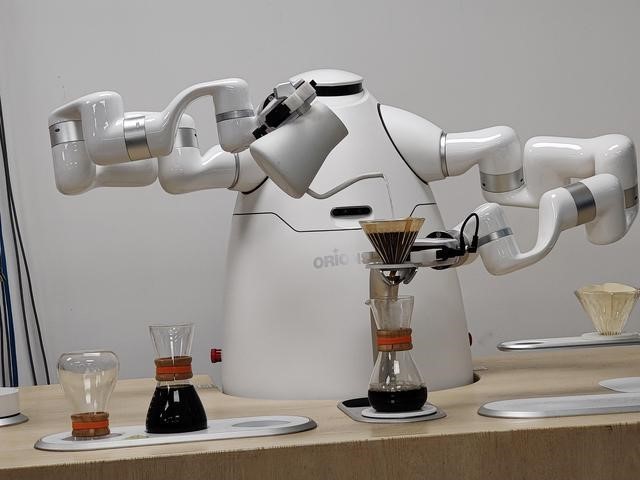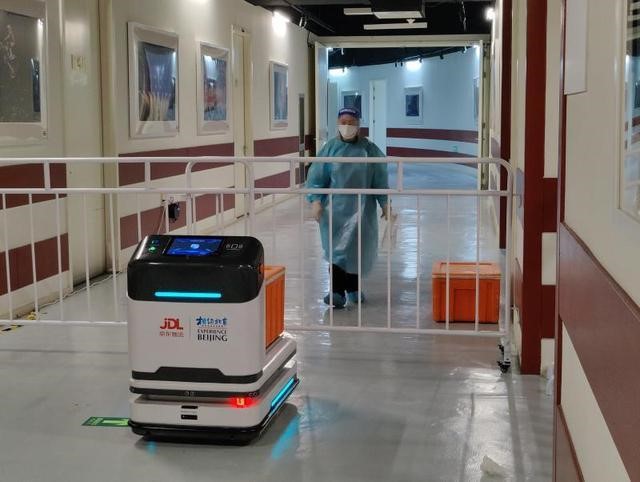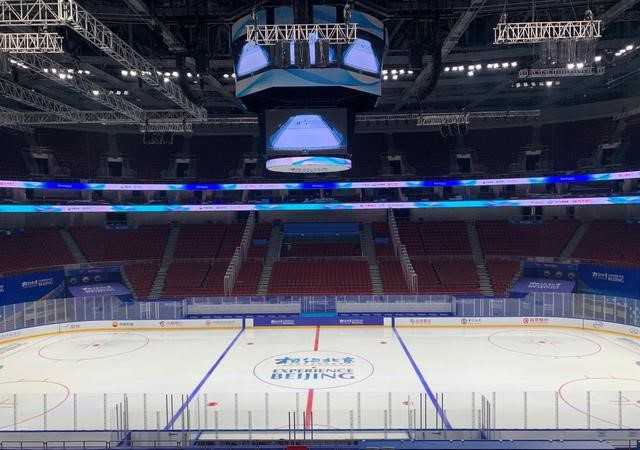Test event for 2022 Winter Olympics employs robots to ensure safe, convenient services
Robots just showed what they got at a 2022 Winter Olympics test event for ice hockey. From making coffee to offering contactless deliveries, they made the games and the preparation work much easier.
The test event "Experience Beijing" was held between Nov. 7 and 10 at Beijing's Wukesong Sports Center, also known as the Cadillac Center, where some of the Olympic ice hockey games will take place in February the next year. The test event was joined by four men's ice hockey teams in Beijing.

Photo shows the robot coffee barista at the Wukesong Sports Center, Beijing. (Photo from Yangcheng Evening News)
During the event, a robot was employed as a coffee barista at the Wukesong Sports Center. It only took four minutes for the robot to make a cup of pour over coffee.
"The robot has two 6-axis robotic arms and it can make different types of coffee. Its operation stability enables it to ensure the same quality and taste for every cup of coffee it makes," said Wei Qing, technical manager of the Wukesong Sports Center.
To make the test event free from possible COVID-19 risks, the organizers of it divided the Wukesong Sports Center into two parts - an inner section and an outer section, and the two sections were isolated from each other. Technical materials, general materials, documents and personal items needed by the staff in the inner section were transported by logistics robots and smart delivery and collection cabins, in a contactless manner.
There was also a buffer zone between the two sections, and that was where the logistics robots worked. Zhang Fan, logistics manager of the Wukesong Sports Center, said that each of the logistics robots was able to carry 30 to 300 kilograms of cargos, and they could deliver the cargos within the venue without any contact to the senders and receivers.

Photo shows a logistics robot at the Wukesong Sports Center, Beijing. (Photo from Yangcheng Evening News)
"They can go everywhere they want, and automatically sense and avoid obstacles around them. Besides, these robots charge themselves automatically, and are able to intelligently plan their routes. In this way, the contacts in the venue are reduced," Zhang said.
The cargos transported by these robots were mostly materials in urgent demand, while those not-so-urgent items were handled by smart cabins. The cabins were 214 centimeters in height, 87 centimeters in width, and 50 centimeters in length. They were placed in the buffer zone, too, with two sides of them facing the inner section and outer section of the venue, respectively.
"Pick-up information is sent to the receivers in the inner section only after the senders outside place the items in the cabin and close the doors. And that's why the service is totally contactless," Zhang explained.
Services and logistics are important for holding the Olympic Games. The Wukesong Sports Center has repeatedly run over procedures in over 30 aspects, including game organizing, venue operation, infrastructure, pandemic control, accommodation and transport, as well as media management.
"We made schedules and detailed plans for every task during the games," said Shi Wei, deputy service director of the Wukesong Sports Center.

Photo shows the Wukesong Sports Center that has turned into an ice hockey venue from a basketball court. (Photo from The Beijing News)
Photos
Related Stories
- Beijing Winter Olympics venue equipped with coffee-making robots, logistics robots
- Foreign media welcome at Olympics
- Cooperation on winter sports boosts bilateral ties between China and Finland: Finnish ambassador
- Building Winter Olympics dreams for China
- Chinese consul-general in Sydney publishes signed article on Beijing 2022 Winter Olympics in the Australian Financial Review
- Discover dazzling black technologies of the 2022 Winter Olympics in Beijing
Copyright © 2021 People's Daily Online. All Rights Reserved.










